
Nepal Adventure Itinerary
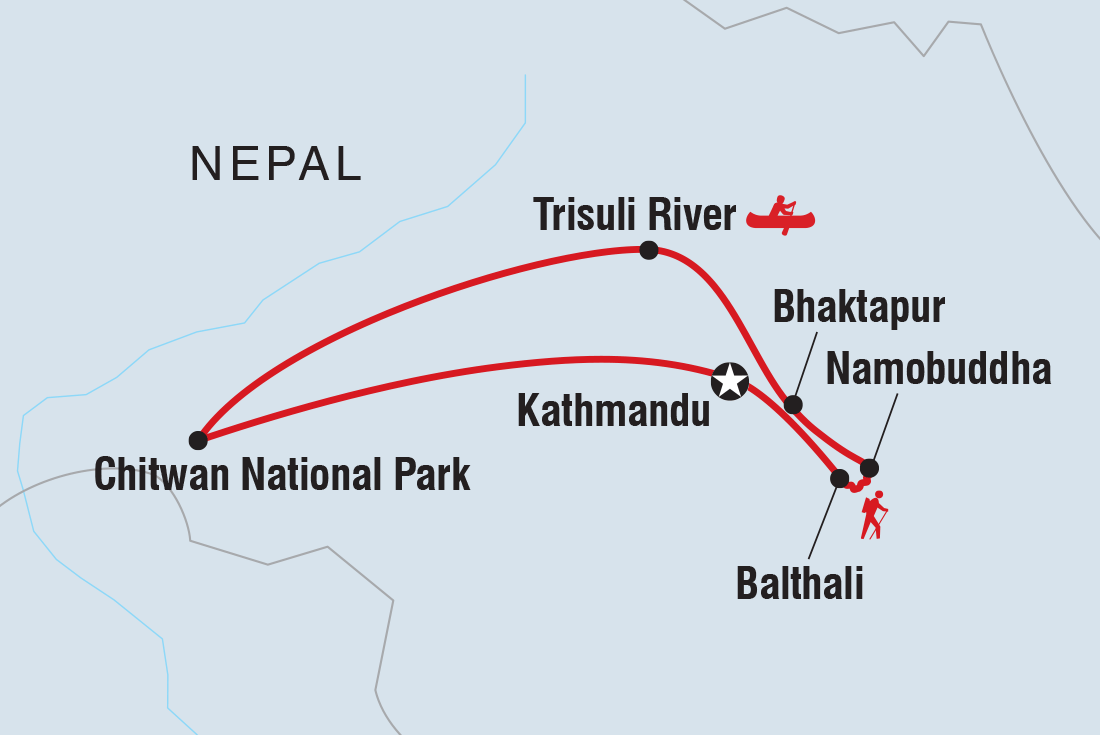


Namaste! Welcome to Nepal. If you arrive early today, why not explore Kathmandu – an incredible mixture of legend and modern development with a rich artistic and cultural heritage. Narrow lanes lead to small squares and courtyards where ornately carved balconies overlook shrines and temples. Buzzing markets and bazaars are the centre of Nepali life, where stalls and small hole-in-the-wall shops sell everything from bangles to Buddhas to beetroot. You’ll have a welcome meeting at 6 pm tonight. After, why not get to know your new travel buddies over a plate of momo – Nepal’s answer to dumplings.
This morning, take a walking heritage tour of Kathmandu’s old bazaars – Hanuman Dhoka and Durbar Square. The labyrinth of backstreets and alleys leading from one bazaar, or ‘chowk’, to another is a true highlight of the city. Visit one of the holiest Hindu temples in the world – Pashupatinath – and let your leader bring the fascinating story behind this temple to life. Nearby is the largest Buddhist stupa in Nepal. Follow the pilgrims' circle around the stupa, spinning the prayer wheels and if you like, take the opportunity to offer your prayers to Lord Buddha by lighting a traditional butter lamp at the main entryway. Visit the monastery located inside Bouddha Stupa, join a small puja ceremony and receive a Lama spiritual blessing. There may be the option for lunch at a rooftop restaurant with an enticing view over the stupa, followed by free time this afternoon to continue exploring Kathmandu at your own pace.
Head to the fringes of the Kathmandu Valley, stopping at the ancient town of Panauti before reaching Khopasi. From here, you can stretch your legs on a 1-hour hike through the thick forest or continue by vehicle to the hill-top village of Balthali. A world away from the ‘Coca-Cola’ hub of Thamel, this peaceful community nestled within a setting of verdant hills and lush rice paddies remains largely undiscovered. Soak up the tranquil ambience as you relax in your accommodation for the night, with its commanding views of villages and farms and the mighty Himalayas rising on the horizon.
Journey to Namobudda today. In the afternoon set out for a walk in Dapcha Village. Dapcha’s main street is lined with old townhouses and was once on the route that pilgrims, traders, invaders and defenders used between the Valley and east Nepal. Enjoy the view, Dapcha has a view of 350km of peaks from Khumbu Himal to the Annapurnas. In Namobuddha visit the stupa and impressive Thrangu Tashi Yangtse Monastery before settling into your accommodation for the night.
Journey to the medieval town of Bhaktapur. Bhaktapur preserves the old-world charm of the Kathmandu Valley. Its timeless craftsmanship is evident in its temples and squares, and its people are still fiercely devoted to the ways of life and faith passed on from their ancestors. Enjoy an afternoon walking tour of the town, including the temples of Taumadhi Tole and Durbar Square, then spend the rest of the time exploring on your own. Tonight, you’ll stay in Bhaktapur.
After breakfast, leave Bhaktapur and follow Kathmandu Road to the Trisuli River – the launching place for your two-day rafting experience. Meet the crew who will run through the safety briefing and prepare you for the adventure. Trisuli River is an ideal introduction for first-time rafters, with reasonably calm waters and only minor rapids – meaning you can relax and really enjoy the ride! Soak up the scenery (and the splashes) as you traverse impressive gorges and beautiful valleys. Depending on the water conditions, you’ll be on the river for approximately 4 hours, with a stop for lunch. Tonight, you’ll stay in a permanent tented camp on the riverside and enjoy a group dinner.
After breakfast, continue your rafting adventure and drift along clear Himalayan white water, occasionally battling the rapids (and maybe your fellow rafters). Your rafting experience will finish around lunch. Say goodbye to your crew and put on your safari hat as the group drives down to the lowlands and onto Chitwan National Park. UNESCO declared this park a World Heritage site in 1984, and it offers some of the best wildlife viewing in Asia. Look out for rhinos, deer, monkeys, beers and a wide array of birdlife here, including the infamous Nepalese wild chicken. Your accommodation here is a real treat – built in traditional Tharu village style, you’ll be surrounded by nature and the exotic sounds of the jungle.
Today is all about exploring Chitwan National Park and discovering the wildlife that lies within. After breakfast, hop aboard a jeep and take a 4-hour safari drive through the park – if you're lucky, you might catch a glimpse of one of the Shere Khan-esque Bengal tigers that call the park home. After your safari, you’ll float down the Rapti River in a dugout canoe, keeping an eye out for the great Indian rhino as well as deer, exotic bird life and the marsh mugger crocodiles that inhabit the riverbanks. A birdwatching walk through the forest and across the grasslands is also a great way to connect to the land. Later, you’ll attend a cultural performance before heading to your jungle resort for dinner.
After breakfast, this morning is free to explore the jungle or go birdwatching. This afternoon, take a transfer to Kathmandu. When you arrive, you can join a walk through the backstreets and the vibrant local markets of the city to Ashan Bazar and Indra Chowk near Kathmandu Durbar Square. See the old royal palace and numerous beautiful temples nearby, and browse the stalls of merchant's wares. Hunt for the perfect souvenir (Tibetan prayer flags, Thanka paintings, singing bowls and pashmina shawls are popular) and perfect your bargaining skills. Tonight, maybe grab your group for a farewell feast of momo (dumplings) to celebrate an incredible trip.
Your trip ends after breakfast today, and you can leave any time after checkout. If you’d like to stay longer, just speak to your booking agent.
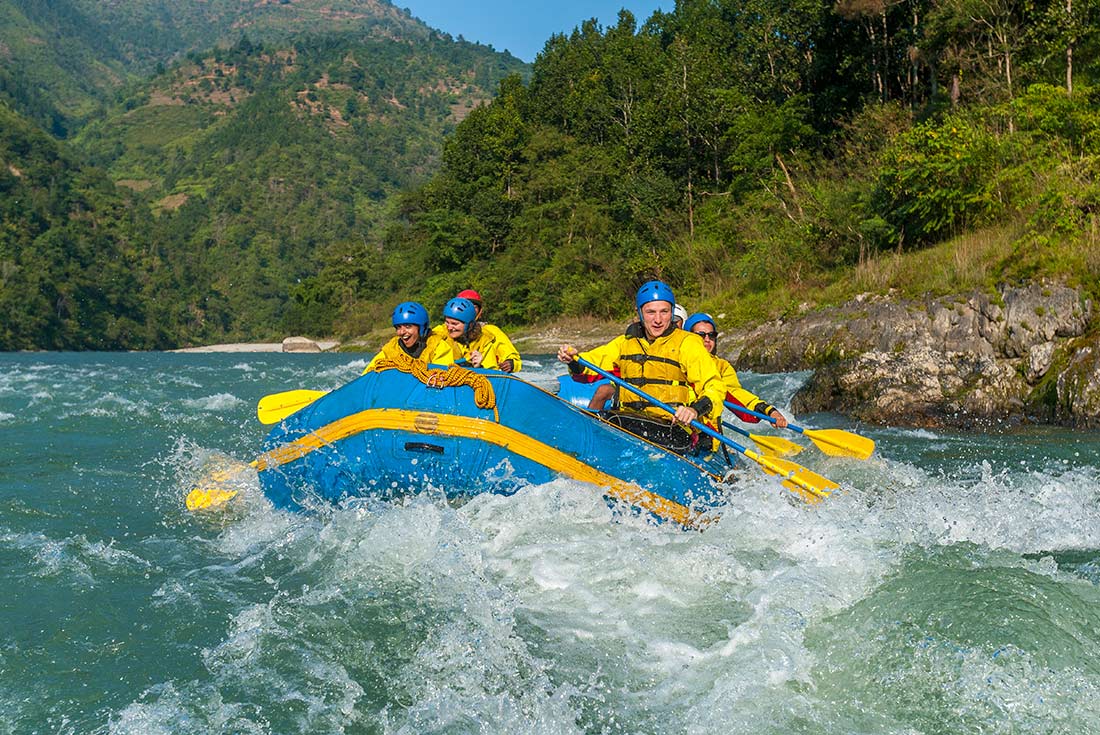
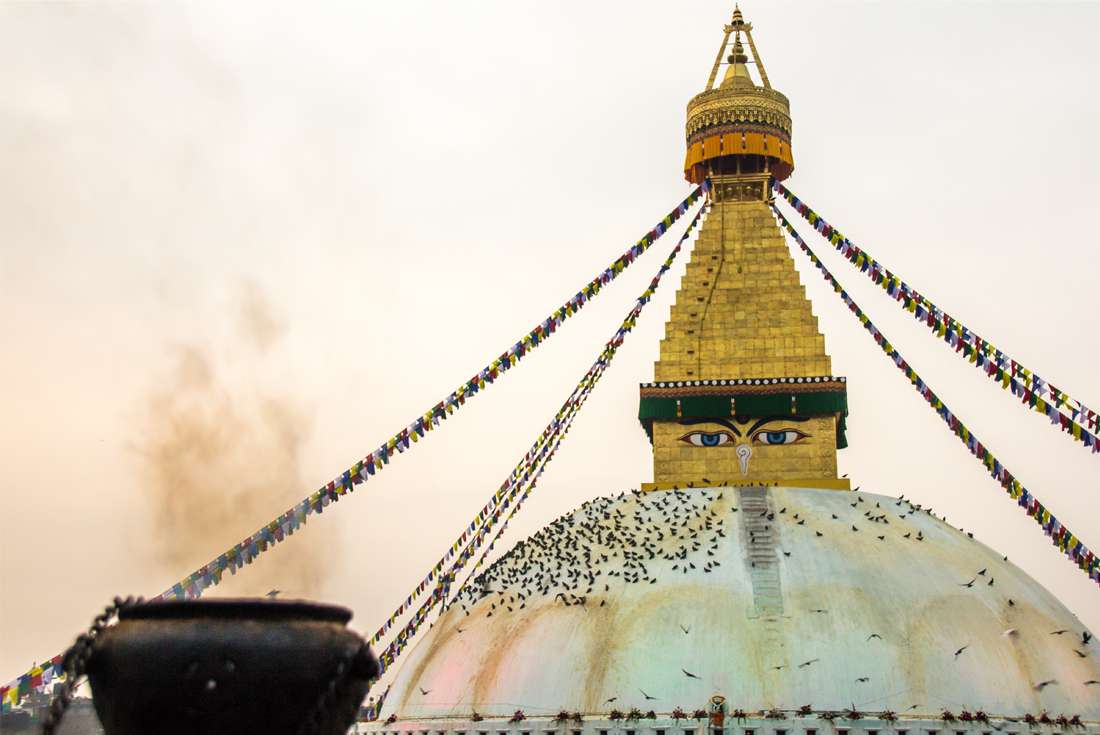
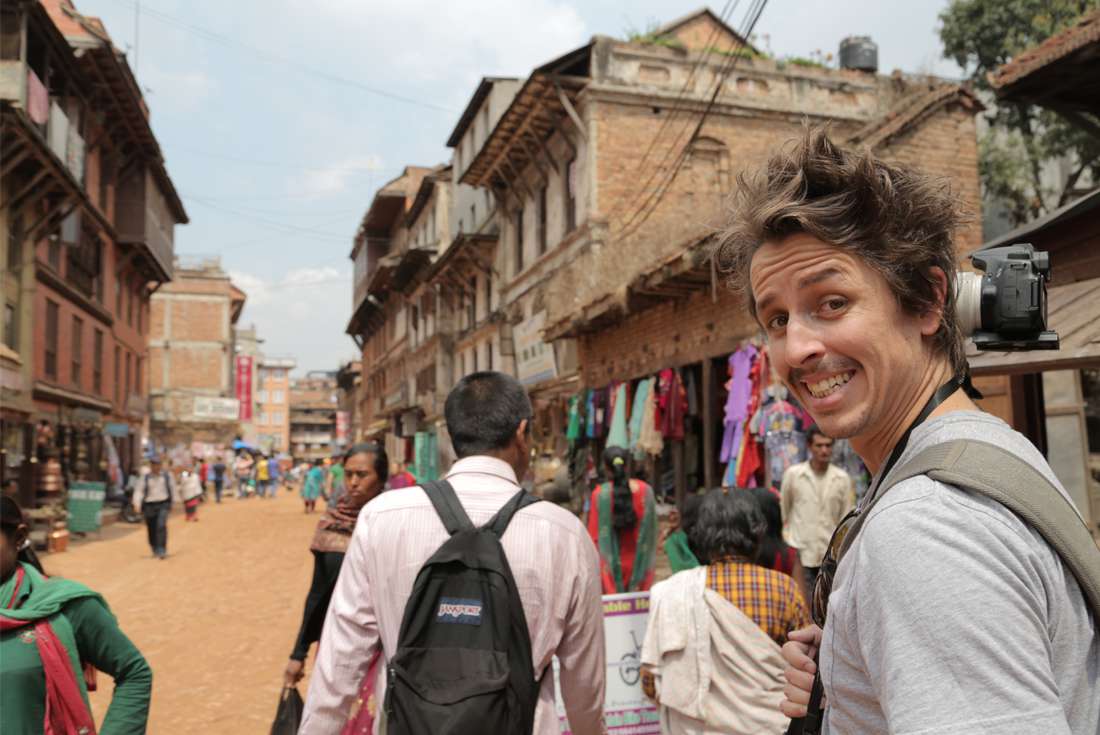
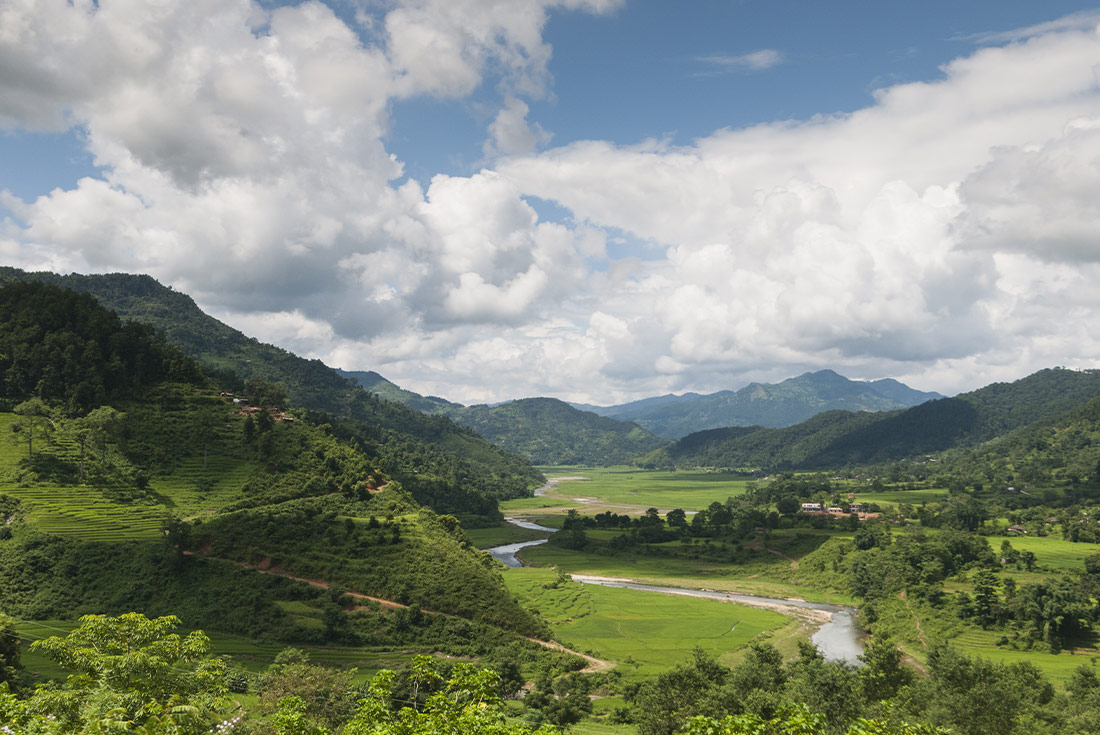
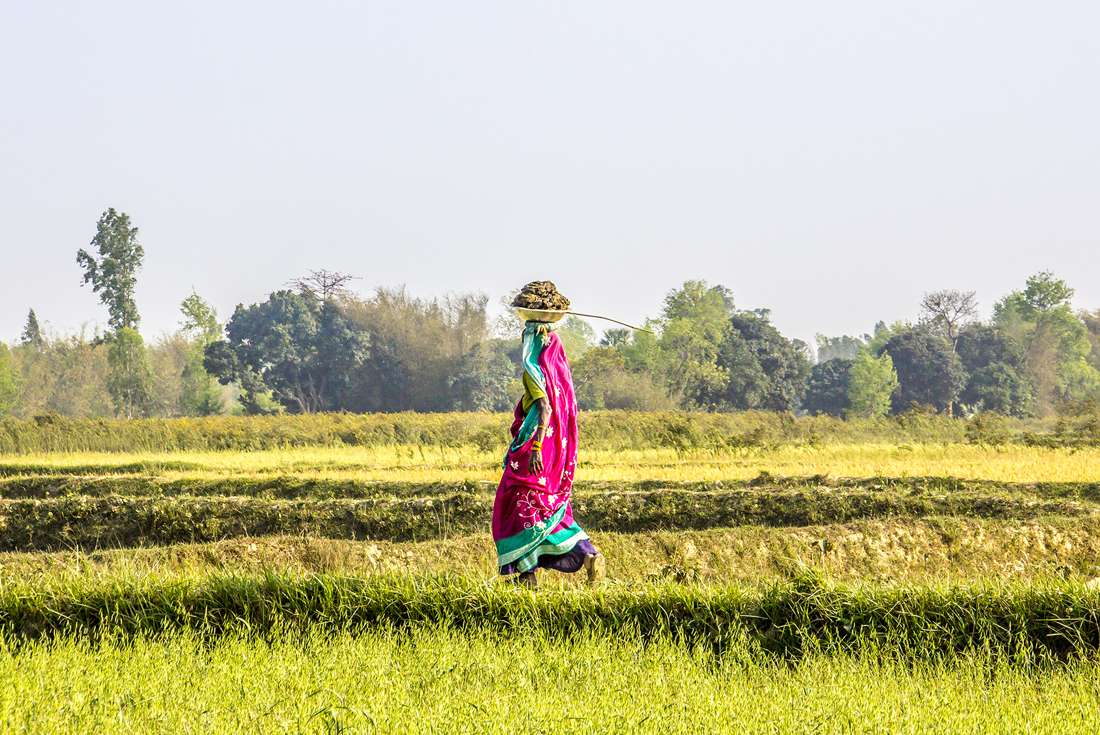
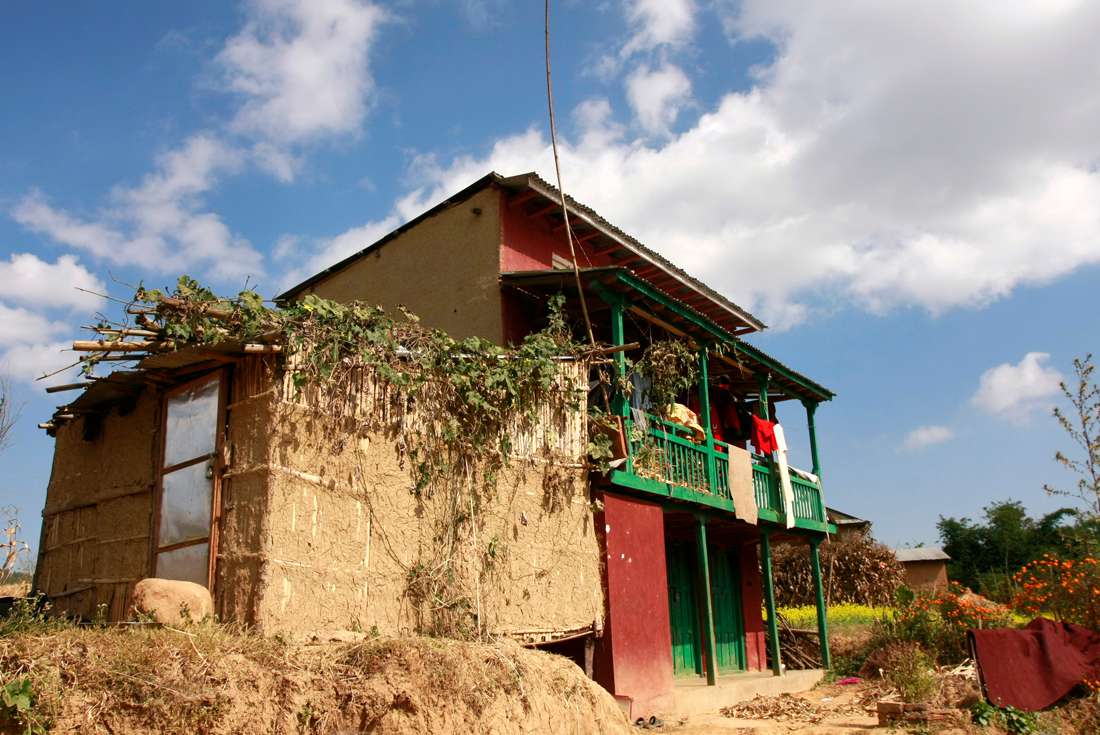
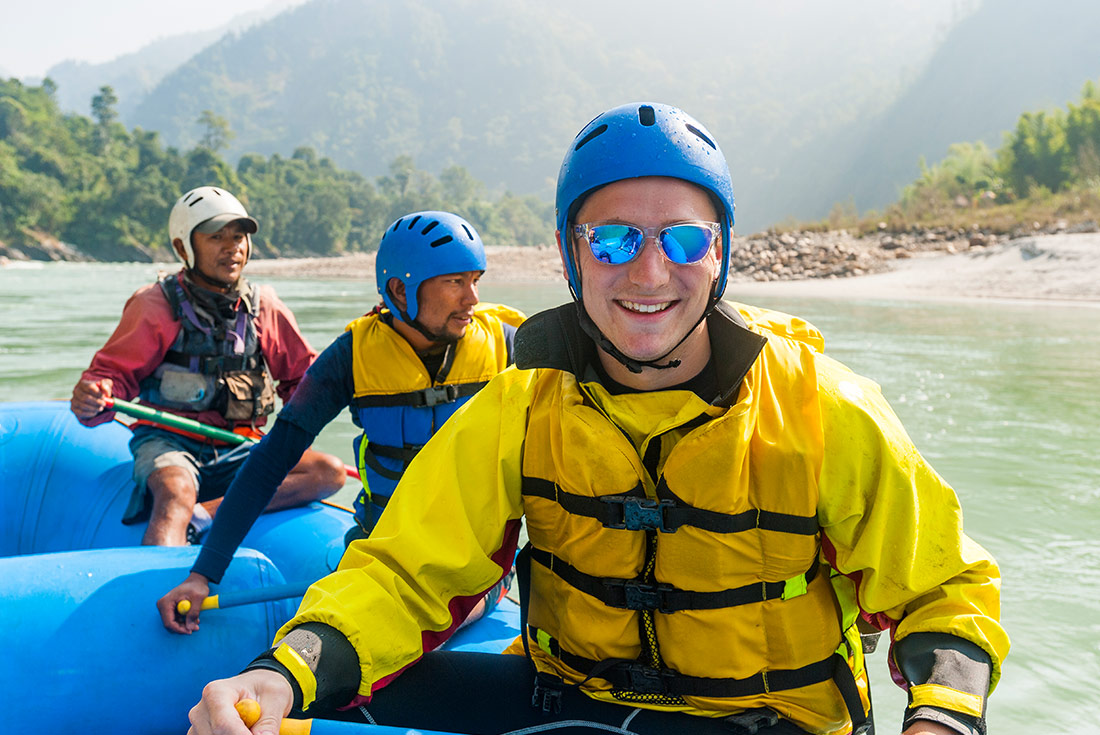
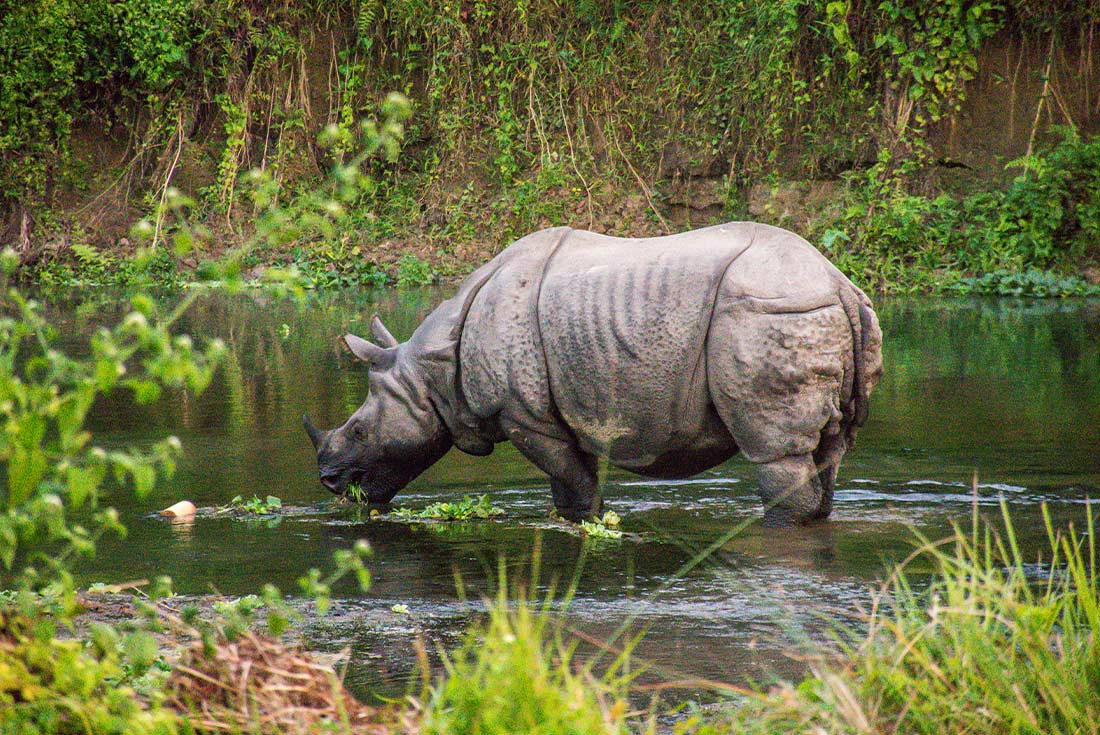
Kathmandu - Pashupatinath Temple
Kathmandu - Durbar Square
Kathmandu - Boudhanath Stupa and Monastery visit with Lama blessing and Puja ceremony
Panauti - Leader-led walk
Kathmandu Valley - Hike from Khopasi to Balthali
Namobuddha - Thrangu Tashi Yangtze Monastery
Namobuddha - Dapcha Village walk
Bhaktapur - Leader-led walking tour
Trisuli River - White Water Rafting (Grade 3)
Trisuli River - White Water Rafting (Grade 3)
Canoe Ride & Jeep Safari at The Chitwan National Park
Chitwan NP - Tharu cultural performance
Whether it's hiking, driving or white-water rafting, this trip will let you experience Nepal's stunning natural beauty from all angles.
Be enchanted by the heart-warming people of Nepal on an overnight stay in a hill-top village retreat, surrounded by rustic farms and overlooking the mighty Himalayas.
Discover hidden gems far removed from Kathmandu's bustle, like the pilgrimage site of Namobuddha
Once home to a royal hunting reserve, Chitwan is now widely recognised as one of the best national parks in Asia, and this trip includes walking, canoeing and driving safaris through its lush landscapes.
Feel the adrenaline rush on a two-day white-water rafting adventure – spend the night camping under the Nepalese stars on the banks of the Trisuli River.
Beginning and ending in Kathmandu, there's more than enough time to discover the Nepali capital's staggeringly rich cultural and artistic heritage.
Hotel Moonlight, #16, Paknajol, Thamel, Bagmati, Kathmandu , Kathmandu, NEPAL, Phone: +977 14980636
Hotel Moonlight, #16, Paknajol, Thamel, Bagmati, Kathmandu , Kathmandu, NEPAL, Phone: +977 14980636
1. A single supplement is available if you’d prefer not to share a room on this trip. The single supplement excludes Day 6 (Camping) where you will be in shared accommodation and is subject to availability. Please speak to your booking agent for further information.
While we always endeavour to provide the best possible holiday experience, due to the nature of travel and the areas we visit sometimes things can and do go wrong. Should any issue occur while you are on your trip, it is imperative that you discuss this with your group leader or local representative straight away so that they can do their best to rectify the problem and save any potential negative impact on the rest of your trip.
We recognise that there may be times when your group leader or local representative may not be able to resolve a situation to your satisfaction - if this is the case, please ask the group leader or local representative to speak to their direct manager.
You may also choose to provide details in your online feedback, which we ask you to complete within 30 days of the end of your trip. Please do be aware that it is very difficult for us to provide any practical help after the trip is completed, so informing us while still travelling will give us the opportunity to resolve the issue in real-time., For general contact details please use the following page: https://www.intrepidtravel.com/contact-us, In case of a genuine crisis or emergency, you can reach our local office on the numbers below:
, Available for phone call or WhatsApp call on +977 980 112 3617
There are some long travel days on roads that seem to be permanently under construction. What looks like a short distance on a map can take an unexplainably long time to complete. Plenty of patience (and maybe some good podcasts at the ready) will go a long way toward your enjoyment of the journey., This trip does not go to high altitude, so if you were hesitant to explore Nepal because for this reason you should have little trouble acclimatising on this tour., As there as an included rafting activity, please speak to your leader in advance if you are not a confident swimmer. There is also the option to sit out this activity and instead spend time relaxing at the campsite., While at the Trisuli river we have an included night of camping. This is at a permanent campsite where tents, mats and sleeping bags provided and toilet facilities are basic., Outside of the main cities, Nepal can be a quiet place, with few ‘tourist’ attractions and options for organised activities. There is plenty of time for your own exploration or relaxation. Don't expect each day to be action-packed, but be ready to seek out your own, more simple cultural experiences., As we stay in some locations where there are few options for eating out, some meals may be set menus rather than being able to choose from a variety of options., If you would prefer a cultural trip in Nepal in Comfort style, check out our Classic Nepal (HNKA)
Whether it's hiking, driving or white-water rafting, this trip will let you experience Nepal's stunning natural beauty from all angles., Be enchanted by the heart-warming people of Nepal on an overnight stay in a hill-top village retreat, surrounded by rustic farms and overlooking the mighty Himalayas., Discover hidden gems far removed from Kathmandu's bustle, like the pilgrimage site of Namobuddha, Once home to a royal hunting reserve, Chitwan is now widely recognised as one of the best national parks in Asia, and this trip includes walking, canoeing and driving safaris through its lush landscapes., Feel the adrenaline rush on a two-day white-water rafting adventure – spend the night camping under the Nepalese stars on the banks of the Trisuli River., Beginning and ending in Kathmandu, there's more than enough time to discover the Nepali capital's staggeringly rich cultural and artistic heritage.
All group trips are accompanied by one of our group leader or local representative. The aim of the group leader or local representative is to take the hassle out of your travels and to help you have the best trip possible. Intrepid endeavours to provide the services of an experienced group leader or local representative however, due to the seasonality of travel, rare situations may arise where your group leader or local representative is new to a particular region or training other group leader or local representative.
Your group leader or local representative will provide information on the places you are travelling through, offer suggestions for things to do and see, recommend great local eating venues and introduce you to our local friends. While not being guides in the traditional sense, you can expect them to have a broad general knowledge of the places visited on the trip, including historical, cultural, religious, and social aspects. At Intrepid we aim to support local guides who have specialised knowledge of the regions we visit. If you are interested in delving deeper into the local culture at a specific site or location then your group leader or local representative can recommend a local guide service in most of the main destinations of your trip.
TRAVEL ADVISORIES & ALERTS
We recommend that you check your government's foreign travel advisory for the latest information about the destination before you travel. You will also need to ensure that your travel insurance covers you for all destinations and activities on your trip. We also recommend saving the phone number for emergency consular assistance for your government’s consulate in the destination/s you’ll be travelling. Links to travel advisories and any current travel alerts for our trips can be found here: https://www.intrepidtravel.com/travel-alerts
PERSONAL SAFETY
Ensure you have a secure method of carrying your passport, phone, credit cards and cash while travelling such as a money belt. Leave all other high value items, including jewellery, at home Use safety deposit boxes at hotels to store your valuables when available and ensure your luggage is lockable. Be aware of the risk of pick-pocketing and petty theft. Exercise caution when walking at night, don’t walk alone and stick to well-lit streets wherever possible. Be vigilant on public transport and look out for your fellow travellers. Take precautions such as carrying your bag in front of you and never leaving personal items unattended.
LGBTQIA+ TRAVELLERS
Intrepid welcomes all LGBTQIA+ customers on our trips, however we operate in parts of the world that are less accepting. We support LGBTQIA+ customers to travel to these destinations and are committed to ensuring they face no discrimination on any part of the trip we control. We recommend you visit Equaldex (https://www.equaldex.com/) and your government's foreign travel advice for LGBTQIA+ travellers when choosing your trip., https://www.intrepidtravel.com/safety-guidelines, STRIKES:
Demonstrations and protests are common in Nepal, with strikes regularly occurring that may result in curfews or roadblocks being enforced at short notice. At these times, businesses may close and vehicles may not be allowed on the roads. You should avoid any demonstrations or political gatherings and follow local advice, including that of your group leader or local representative in the event of any disruptions.
PETTY THEFT & CRIME:
Pickpocketing and other petty theft is common, especially in places where tourists or foreigners frequent. Take care when walking around at night. Avoid walking on your own and don’t carry large sums of cash. Keep valuables in a hotel safe if possible. Bars and restaurants now close at midnight as part of a government crackdown on illegal activities. Foreigners remaining in bars and clubs after hours have been detained by the police. Police have increased their presence in Thamel and Durbar Marg, popular tourist districts in Kathmandu, in an effort to reduce crime in these areas. You should seek out police if you have been robbed or affected by any crime.
ALTITUDE:
Altitude sickness is a risk, including on the Annapurna, Langtang and Everest Base Camp treks. Please make sure you familiarise yourself with signs and symptoms before you depart and monitor your own health during your trek.
INSURANCE:
Make sure your insurance covers you for your intended activities, including travel and trekking above 3000m if this is included on your itinerary, mountain rescue services and helicopter evacuation costs.
FESTIVALS:
Travelling in Nepal during Holi Festival (23-25 March 2024), can at times be dangerous due to revellers consuming intoxicating substances. The day is often associated with physical violence and danger. Your group leader or local representative will advise you and your group on what places to avoid on this day and it may even be necessary for us to alter your itinerary for the day to avoid putting you or your group leader or local representative in a high-risk situation.
Travelling during the Hindu festival Diwali (12 Nov 2023, 1 Nov 2024) can also be dangerous. During this time there are many displays of fireworks in the streets. It can be very noisy for several days and there is also a lot of pollution caused by the fireworks. As there are no restrictions on buying fireworks there are often injuries caused by people exploding them inappropriately. During this festival, your group leader or local representative may be required to alter your itinerary to avoid any dangerous areas to avoid putting the group at risk.
INTERNAL FLIGHTS:
There have been a number of air accidents in Nepal. We only use airlines that have passed strict safety audits for included internal flights in Nepal, including Buddha Air, Summit Air.
PASSPORT
You’ll need a valid passport to travel internationally and most countries require your passport to have a minimum of 6 months validity, so remember to check the expiry date.
We need your passport information to get everything ready for your trip so it’s important that the information on your booking matches your passport exactly. Please take care to provide the correct details. We recommend carrying a copy of the photo page of your passport while travelling and leaving a copy at home with family or friends.
VISAS & ENTRY REQUIREMENTS
Many countries require a visa and obtaining the correct visa for your trip and any countries you may transit through is your responsibility. We recommend you check your visa requirements as soon as you have booked your trip. This will ensure you have time to prepare your documents and for your visa application to be processed. You can check the entry requirements for your nationality on your government's foreign travel advisories, consular websites or on our page here: www.intrepidtravel.com/visa-entry-requirements
Information not available.
Validity: 01 Jan 2026 to 31 Dec 2026
GENERAL HEALTH
All travellers need to be in good physical health in order to participate fully on this trip. For the safety and wellbeing of yourself and others, if you are unwell prior to travelling, please stay at home and contact us to make alternative arrangements.
When selecting your trip please make sure you have read through the itinerary carefully and assess your ability to manage and enjoy our style of travel. Please note that if in the assessment of our group leader or local representative a traveller is unable to complete the itinerary without undue risk to themselves and/or the rest of the group, we reserve the right to exclude them from all or part of a trip without refund.
You should consult your doctor for up-to-date medical travel information or for any necessary vaccinations before departure. We recommend that you carry a first aid kit as well as any personal medical requirements in their original packaging as they may not easily be obtained while travelling. If you are carrying medication, ensure you check your government's foreign travel advice for any local restrictions or requirements.
, AIR POLLUTION:
Air quality in Nepal can be poor, especially in winter. Some towns, including Kathmandu, experience very high levels of seasonal smog and heavy particulate pollution. Seek medical advice if you're concerned about the effects of air pollution.
ALTITUDE SICKNESS:
Travellers to altitudes higher than 2,500m are at risk of altitude sickness, also known as acute mountain sickness (AMS). This can be life-threatening and affect anyone, even people who are very physically fit. There is a higher risk for those who have had altitude sickness before, who exercise or drink alcohol before adjusting to the altitude, or who have health problems that affect breathing. If your tour travels to high altitude, see your doctor for advice specific to you and your situation before you depart. It is important to be aware of the normal altitude symptoms that you may encounter BUT NOT worry about:
- Periods of sleeplessness
- Occasional loss of appetite
- Vivid, wild dreams at around 2500-3800m in altitude
- Unexpected momentary shortness of breath, day and night
- Periodic breathing that wakes you occasionally
- Blocked nose
- Dry cough
- Mild headache
If you are feeling nauseous, dizzy, or experience other symptoms, please be sure to let your group leader or local representative know immediately so that we can monitor your condition.
Please be aware that should your group leader or local representative deem it unsafe for you to continue trekking at any time, they will arrange for you to descend to a lower altitude.
Please read the following document carefully and, during your trip, utilise the table on the back daily to record your own perspective of your general health and any symptoms you may experience: https://www.intrepidtravel.com/altitude-sickness
On some days this trip may ascend faster than commonly published recommended ascent rates at altitude. However, based upon an assessment by our external safety and medical advisors, and in conjunction with our own risk assessments, we consider that the ascent rate is acceptable due to the additional safety measures that are in place for our customers. If you have concerns about this, please speak to your booking representative.
All our group leaders or local representatives in the Himalayas are trained in the use of a PAC bag (Portable Altitude Chamber) and this is carried on all trips which go above 4,200m. The PAC bag is used in an emergency only to treat altitude sickness in the mountains. A First Aid kit is carried with the group and all our group leaders or local representatives are First Aid trained. Please ensure that your travel insurance policy does cover you up to the maximum altitude on this trip, and includes helicopter evacuation. Please take proof of this with you on the trip, as you will need to show it to the group leader or local representative.
MOSQUITO-BORNE ILLNESSES:
Malaria is a risk in some areas of Nepal including Chitwan National Park. Dengue fever and Japanese encephalitis also occur, including on occasion in Kathmandu. Protect yourself against insect bites by wearing adequate protection, including repellent.
MEDICAL FACILITIES AND TREATMENT:
Medical facilities in Nepal are very limited, particularly outside Kathmandu. In Kathmandu, treatment at international-standard clinics is expensive and up-front payment for services is generally required. Make sure you have adequate travel health insurance and accessible funds to cover the cost of any medical treatment, including evacuation by helicopter.
FOOD IN NEPAL:
In Kathmandu and Pokhara there are plenty of restaurants and cafes for all tastes and budgets. For a glimpse at what traditional Nepali cuisine entails, check out our guide here: https://www.intrepidtravel.com/adventures/guide-to-nepali-cuisine/
Nepal caters very well towards vegetarians and vegans with almost all restaurants having a veg section of the menu. Your group leader or local representative will be able to direct you towards restaurants that are known to have better hygiene, especially in tourist areas where they are travelling with our groups regularly.
SPENDING MONEY
When it comes to spending money on the trip, every traveller is a little different. You know your spending habits better than we do, so please budget an appropriate amount for things like optional meals, drinks, shopping, optional activities, and laundry. Make sure you have read the itinerary and inclusions thoroughly so you know what is included in the trip price and what you may need to pay for while travelling. , NEPAL
The official currency of Nepal is the Nepali rupee (NPR). Its symbol is often displayed as Rs. ATMs can only be found in Kathmandu, Pokhara, and Bhaktapur. Make sure you carry sufficient cash to cover your needs when travelling outside these cities. Money exchange facilities are available in Kathmandu, Namche, Pokhara, Chitwan (only outside the park), and Bhaktapur. Credit cards are not widely accepted.
The Government of Nepal has banned the import, export, and use of 500 and 1000 Indian rupee notes in Nepal. You should ensure you are not carrying these notes on arrival in Nepal as they will be confiscated and you may be fined.
Before departing on a trek or travelling to remote areas, make sure you have enough Nepalese currency to purchase meals and drinks, in the smaller denominations where possible, as there are no ATMs and larger notes (such as NPR 1000) can be difficult to change.
USD cash is the easiest to exchange. We recommend bringing large bills in good condition, 2013 series onwards only. Any old or damaged notes may not be accepted.
NPR is a blocked currency, which means it can only be obtained in Nepal and cannot be exchanged outside Nepal. Ensure you use or exchange all NPR before leaving the country.
, TIPPING
Tipping can be an appropriate way to recognise great service when travelling. While it may not be customary in your home country, it is an entrenched feature of the tourism industry across many of our destinations and is greatly appreciated by the people who take care of you during your travels. It is always best to avoid tipping with coins, very small denomination notes, or dirty and ripped notes, as this can be regarded as an insult rather than the goodwill gesture it is intended to be., OPTIONAL TIPPING KITTY
On Day 1 of your trip, your group leader or local representative may discuss with you the idea of operating a group tipping kitty, whereby everybody contributes an equal amount and your group leader or local representative distributes tips for drivers, local guides, hotel staff and other services included on your trip. Participation in this kitty is your choice, and you are welcome to manage your own tipping separately if you prefer.
The group leader or local representative will keep a running record of all monies spent, which can be checked at any time. Any funds remaining at the end of the trip will be returned to group members. These tips to suppliers are for great service and are in addition to the regular costs paid for the services supplied.
The tipping kitty excludes tips for your group leader or local representative., Optional tipping kitty for this trip: NPR 5000 per person., YOUR GROUP LEADER OR LOCAL REPRESENTATIVE
Tipping your group leader or local representative is highly appreciated if you feel they’ve provided outstanding services throughout your trip. The amount is entirely a personal preference; however, as a guideline, the recommended amount is 4-7 USD or EUR per traveller per day (in a currency relevant to your destination). Of course, you are free to tip more or less as you see fit, depending on your perception of service quality and the length and involvement of your group leader or local representative on your trip., CONTINGENCY FUNDS
We try to plan for every eventuality, but there are still some things beyond our control. We reserve the right to change an itinerary after departure due to local circumstances or a Force Majeure Event. In such emergency circumstances, the additional cost of any necessary itinerary alterations will be covered by you. Please note we are not responsible for any incidental expenses that may be incurred as a result of the change of itineraries including but not limited to visas, vaccinations or non-refundable flights. Make sure you have access to an extra US$500 for emergencies (e.g. severe weather, natural disasters, civil unrest) or other events that result in unavoidable changes to the itinerary (e.g. transport strikes or cancellations, airport closures). Sometimes these things necessitate last-minute changes to enable our trips to continue to run, and as a result, there may be some extra costs involved. The recommended amount is listed in USD for the relatability of universal travellers, however, local currency may be needed once in the country to cover these costs.
Below is a list of equipment and documentation that we suggest you take with you. Please use this checklist as a guide when packing for your holiday.
- Travel documents: passport, visa (if required), travel insurance, air tickets or e-ticket receipts, trip notes
- Photocopy of main passport pages, visa (if required), travel insurance and air tickets
- Spare passport photos
- Money: cash/credit card/EFTPOS card
- Money belt
- Small padlocks
- Personal first-aid kit
- Daypack for use on day or overnight excursions
- Watch/alarm clock and torch/flashlight (and spare batteries)
- Electrical adapter plug
- Toiletries/roll of toilet paper/travel wipes
- Insect repellent
- Sunscreen, lip balm, sunhat and sunglasses
- Earplugs and eye mask (for light sleepers)
- Extra pair of prescription glasses (if required)
- 2 strong plastic garbage bags (for laundry and in case of rain)
- Refillable water bottle
- Phrasebook
- Warm clothes - when travelling in cooler climates
- Wind and waterproof jacket
- Comfortable and sturdy walking shoes with good walking socks
- Camera/phone (with charger)
- Binoculars
Informal clothing is all that is required. Remember to dress in a modest fashion. Light clothing is usually all that will be required for most of the year. During the winter months, December to February, it will be chilly and possibly foggy in the early mornings, with temperatures dropping down to a minimum of around 0ºC on some days. A warm, windproof jacket will be required.
RAFTING & CAMPING:
When rafting and camping, please bring along the following:
- Sports shoes eg. trainers (x2, you will need a spare, dry pair) or rubber-soled sandals that attach securely to your feet
- Sunglasses
- Swimming costume
- Sunscreen
- Flashlight
- Towel
You will also need t-shirts and shorts (for rafting), and light-weight trousers, long-sleeved shirts and a warm jacket for camping., https://www.intrepidtravel.com/packing-list
SEASONAL INFORMATION:
Nepal's climate varies greatly depending on the season:
JUN - SEP: the monsoon rains (mostly at night) bring landslides in regional areas. Cloud cover often obscures mountain views with rain, mud, and leeches deterring most trekkers at this time of year. Treks running in September can be hot and very humid at lower altitudes. See what it's like to trek during monsoon here: https://www.intrepidtravel.com/adventures/nepal-during-monsoon-season/
MAR-APR: Spring brings warm weather and spectacular rhododendron blooms. A popular time to visit and one of the peak times to trek.
OCT - NOV: Clear skies and warm days make autumn the peak season.
DEC - FEB: Winter brings cold temperatures and snow to the mountains. Good trekking,but remember to rug up. Make sure to bring appropriate winter clothing.
Some towns, including Kathmandu, experience very high levels of seasonal smog which can lead to decreased scenic visibility.
Intrepid won't tolerate any kind of violence, harassment (whether physical, verbal or sexual), or disrespect toward fellow travellers, our teams or local communities.
To ensure the wellbeing of everyone on the trip, decisions made by your group leader are final.
Romantic relationships between travellers and group leader or local representative are not permitted while on trip.
Any behaviour that prevents your leader from continuing the itinerary as planned, breaks local laws or opposes any of these guidelines may result in Intrepid denying your booking or removing you from the trip.
If something concerns you during your travels, please speak to your group leader immediately. Alternatively, you can contact us on the emergency contact number detailed in the Problems and Emergency Contact Information section of this Essential Trip Information.
RESORTS:
Some of the accommodation on this trip is in resorts located outside of towns and villages. There are limited options for meals and activities outside of the properties.
TRAVEL BETWEEN KATHMANDU & POKHARA:
On itineraries that include road travel between these destinations, past travellers have often decided to fly this route independently to avoid the long overland journey (200km, approx 6+ hours). The flight takes around 35mins. Should you decide to fly, this will be at your own expense with no refunds for road travel available.
ROAD TRAVEL IN NEPAL:
Roadworks and infrastructure projects can cause significant delays on major roads within cities and highways between destinations. Road travel can also be disrupted due to demonstrations and bandhs (strikes) without warning. Major roadworks are currently ongoing in and around Kathmandu and the roads to Chitwan National Park. Delays, heavy traffic, poor road conditions and dust are a reality of road travel in Nepal.
MONSOON:
The monsoon season is from June to September and weather conditions can disrupt travel during this time due to flooding and landslides. Disruption of air travel and airport closures are also possible. Be prepared that the itinerary may need to change at short notice.
Travel insurance is compulsory on all our trips for those travelling internationally. We require that, at a minimum, you are covered for medical expenses, including emergency repatriation. If you are travelling within your home country or region, please confirm before travel that you are entitled to access the public medical system easily should an accident occur. We strongly recommend all travellers have a policy that also covers personal liability, cancellation, curtailment and loss of luggage or personal effects. For international trips, you will not be permitted to join the group until evidence of travel insurance and the insurance company's 24-hour emergency contact number has been sighted by your group leader or local representative.
If you have credit card insurance, your group leader or local representative will require details of the participating insurer/underwriter, the level of coverage, policy number, and emergency contact number, rather than the bank's name and your credit card details. Please contact your bank for these details prior to arriving in-country.
For travellers who reside within the European Union, Switzerland or the USA, the requirement to purchase travel insurance cannot be compulsory. However, the purchase of travel insurance is still highly recommended, and each country you visit may have its own specific entry requirements. For example, some mandate travel health insurance for all foreign travellers, regardless of their nationality. Travellers from the European Union, Switzerland or the USA who decline travel insurance when travelling outside their home region must sign a Travel Insurance Waiver Form at the Group Meeting, recognizing personal responsibility for emergency medical and repatriation costs should they arise.
For assistance with travel insurance or other services, please visit the link below:
, https://www.intrepidtravel.com/booking-resources/our-services
As you travel on a group trip you will be exposed to all the pleasures and maybe some of the frustrations of travelling in a group. Your fellow travellers will probably come from all corners of the world and likely a range of age groups too. We ask you to be understanding of the various needs and preferences of your group - patience with your fellow travellers is sometimes required for the benefit of everyone's travel experience. Remember too that you have responsibilities to the group. If you are requested to be at a place at a certain time, ensure that you don't keep the rest of the group waiting. We have found time and time again that the very best trips we operate are those where the dynamics within the group work well - this takes just a little effort on your part. Due to privacy reasons, we are unable to provide you with contact details and any personal information about your fellow travellers booked on your trip prior to departure., SOLO TRAVELLERS
On our trips, rooming is organised on a twin-share basis. We pair up solo travellers with another traveller of the same gender, as per the gender marker on each of their passports.
We also offer an optional single supplement on most trips for travellers who prefer to have their own room. This only applies to accommodation during the tour. Pre-trip and post-trip accommodation booked through us will always be on a single-room basis.
On a small selection of trips some accommodation will be open-gender and multishare, such as a felucca in Egypt or an overnight train in Vietnam. Please review the Accommodation section of the Essential Trip Information for details about your trip.
LGBTQIA+ TRAVELLERS
We strive to create a safe and inclusive environment for everyone. If your gender identity differs from what is indicated on your passport, please contact us so that we can discuss rooming options with you.
ITINERARY CHANGES
Our itineraries are updated regularly throughout the year based on customer feedback and to reflect the current situation in each destination. The information included in this Essential Trip Information may therefore differ from when you first booked your trip. It's important that you review this information prior to travel so that you have the latest updates. Due to weather, local conditions, transport schedules, public holidays, political unrest or other factors, further changes may be necessary to your itinerary once in-country. Your group leader or local representative will keep you up to date with any such changes once your trip is underway and has the authority to amend or cancel any part of the trip itinerary if deemed necessary due to safety concerns.
, OPTIONAL ACTIVITIES
A selection of optional activities that have been popular with past travellers are listed in the day-to-day itinerary. This isn't an exhaustive list and should be used as a guide only for some of what might be available. Prices are approximate, are for entrance fees only, and don’t include transport to and from the sites or local guides unless indicated. All activities are subject to availability, and maybe on a join-in basis. It may not be possible to do all the activities listed in the time available at each destination, so some pre-planning for what you are most interested in is advised. When it's recommended that travellers pre-book these activities, look for a note in the Special Information section of the day-to-day itinerary. For most, they can either be organised independently on the day, or let your group leader or local representative know you are interested at the Welcome Meeting and they can assist.
Where activities are considered medium or high risk, we work with operators whose safety and credentials we have sighted and assessed. Although it is possible that you may find the same activity cheaper with another operator on the ground, we cannot vouch for the safety or quality of that operator. Medium and high-risk activities not listed above have not been assessed by us and as such our staff and group leader or local representative are unable to assist you with organising these activities. Activities that contravene our Responsible Travel policies are also not listed. Please remember that the decision to partake in any activity not listed is at your own discretion and risk.